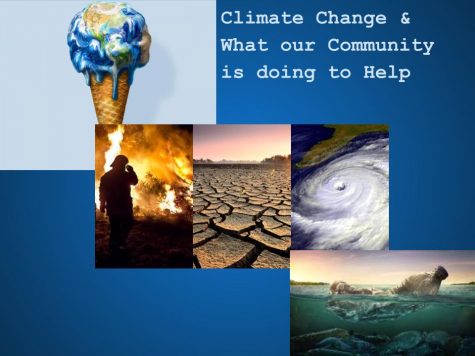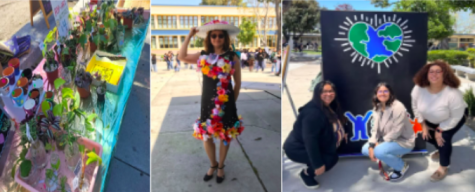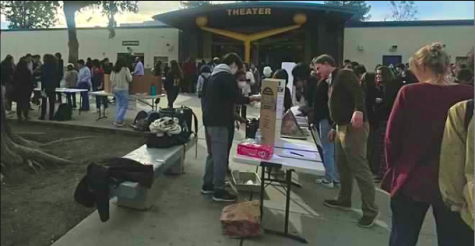Climate Change & What our Community is doing to Help
How does climate change affect us? Climate change affects you all the time and you might not even notice. The oceans are getting hotter, and becoming more acidic, and the weather is getting more extreme. We have asked some of our peers to talk about their perspective on climate change. Cole Spencer, a junior, said “Climate change is real and it sucks because our polar ice caps are melting and species are becoming endangered. We need to fix it before it’s too late.” This is a perfect example of someone who knows what climate change is but not to the full extent.
Another student, August Vu, a junior, said “Climate change is a perfect example of the innate selfishness and sloth of humanity. The problem is that we already have the resources to completely reverse climate change. It’s just a matter of people in power not caring enough or focusing on petty national vendettas or biases. Most people rant and rave about the issue without actually doing anything. Those who actually try to tackle the minute facets of climate change, like recycling more or reusing old trash. The problem is that it’s too small a scale, we need to change policy, not just our lifestyles. Keeping up with climate change is an exercise in cynicism, futility, and learned helplessness. We’ll see where this goes.”
According to NASA, “The Earth’s climate has changed throughout history. Just in the last 650,000 years there have been seven cycles of glacial advance and retreat.” Though this is true, what is significant about the warming trend of the current day is that it is a “… greater than 95 percent probability,” that it is a result of human activity after the mid 20th century.
The Earth’s average surface temperature has risen about 1.62 degrees Fahrenheit since the late 1900s, largely due to increased carbon dioxide and other man-made emissions that have been put into the atmosphere. Of the planet’s rising temperature, most of it has “…occurred in the past 35 years, with the five warmest years on record taking place since 2010…”
In fact, 2019 was the warmest year in Earth’s history.
Due to the Earth’s warming climate, the world’s oceans are being greatly affected. According to the Environmental Defense Fund, “… the frozen water on Earth – is melting… Melting glaciers and polar ice sheets contribute to unprecedented sea level rise. Melting sea ice exposes darker ocean waters, which absorb more sunlight than ice – heating the ocean more and speeding up a relentless cycle of melting and heating.”
Not only is the earth’s warmth affecting the planet, but so is the huge amounts of man-made emissions. One third of carbon dioxide emissions end up in our oceans, this causes a chemistry change, making the water “… nearly a third of carbon dioxide emissions end up in the oceans, triggering a chemistry change that makes the water more acidic, “… almost 40 percent more acidic than it used to be.” The increased acidity of the ocean waters causes irreparable damage to sea life, dissolving the shells of sea creatures.
All of this combined results in Weather becoming more extreme, dangerous, and deadly. Due to the world’s increased temperature, heat waves have become more frequent worldwide. The heightened amount of evaporated water is “… like fuel for storms, exacerbating extreme weather events, such as hurricanes. [and] Rising sea levels make storm surges capable of much greater damage. In more naturally arid areas, droughts and wildfires are intensifying” (Environmental Defense Fund). Proof of this is not shown better than wit the recent disasters plaguing the planet. For example, at the start of 2020 Australia, after its hottest year on record, experienced its worst bushfire season ever. The heat from the previous year left soil and fuels exceptionally dry resulting in “The fires … [burning] through more than 10 million hectares,.. [killing] at least 28 people,.. [razing] entire communities to the ground.. [taking] the homes of thousands of families, and … [leaving] millions of people affected by a hazardous smoke haze.” Around a billion or more native animals of Australia have been killed, and many species and ecosystems will never be able to recover.
What can we do to help?
Team Trees, also known as #teamtrees, is a 2019 collaborative fundraiser that managed to raise 20 million U.S. dollars before 2020 to plant 20 million trees. The initiative was started by American YouTubers MrBeast and Mark Rober, and was mostly supported by YouTubers. All donations go to the Arbor Day Foundation, a tree-planting organization that pledges to plant one tree for every U.S. dollar donated. The Arbor Day Foundation plans to begin planting in January 2020 and end no later than December 2022″. It is estimated that 20 million trees would take up (69 sq mil of land,absorb around 1.6 million tons of carbon and remove 116 thousand tons of chemical air pollution from the atmosphere.
Friends of the Earth describes itself as a “bold and fearless voice for justice and the planet”. Recent campaigns have targeted bee-killing neonicotinoid pesticides, “dirty” tar sands oil extraction, and the environmental devastation of palm oil production. Those who oppose widespread adoption of nanotechnology, genetically engineered foods, and human gene patenting will appreciate FOE’s clear stance and advocacy.
More people need to learn more about climate change. Many people should not only learn about climate change but also help change the way people do everyday things. Climate change is real and people need to understand that. We hope that this article has helped you learn more about climate change and promotes you to change your lifestyle to help stop climate change.
Sources:
Callery , Susan, and Daniel Bailey . “Climate Change Evidence: How Do We Know?” NASA, NASA, 30 Dec. 2019, Web. 30. Jan. 2020 https://climate.nasa.gov/evidence/
Woodyatt, Amy. “Smoke from Australia’s fires will make ‘full circuit’ around the world.” 2020 Cable News Network. CNN World, 14 Jan. 2020. Web. 14 Jan. 2020. https://www.cnn.com/2020/01/14/australia/nasa-smoke-full-circuit-intl-scli-scn/index.html
Harrabin, Roger and McGrath, Matt. “Climate change: Last decade confirmed as warmest on record” 2020 BBC. BBC News. 15 Jan. 2020. Web. 15 Jan. 2020. https://www.bbc.com/news/science-environment-51111176
Hockenos, Paul. “Australian Bushfires Point to an Ominous Pattern.” CNN, Cable News Network, 4 Jan. 2020, Web. 30. Jan. 2020
Oxfam, Pablo. “5 Natural Disasters That Beg for Climate Action.” Oxfam International, Oxfam International., 28 Jan. 2020, Web. 30. Jan. 2020 https://www.oxfam.org/en/5-natural-disasters-beg-climate-action
“How Climate Change Plunders the Planet.” Environmental Defense Fund, Environmental Defense Fund., 2020, Web. 30. Jan. 2020 https://www.edf.org/climate/how-climate-change-plunders-planet
“How did Australia fires start and what is being done? A very simple guide.” 2020 BBC. BBC News, 7 Jan. 2020. Web. 14. Jan. 2020. https://www.bbc.com/news/world-australia-50980386









